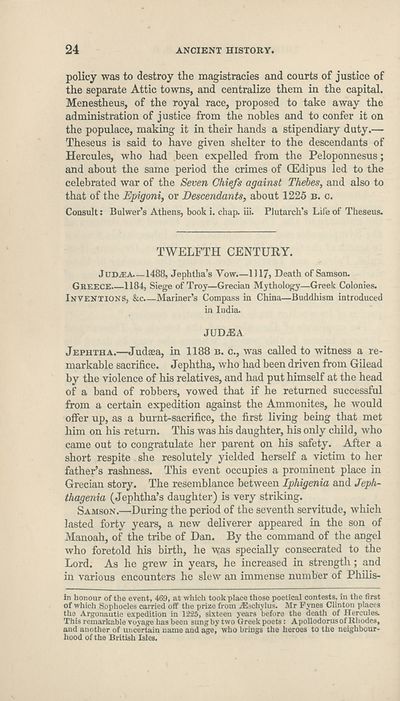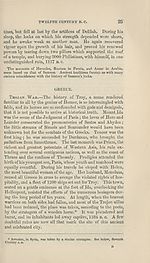Download files
Complete book:
Individual page:
Thumbnail gallery: Grid view | List view

24
ANCIENT HISTORY.
policy was to destroy the magistracies and courts of justice of
the separate Attic towns, and centralize them in the capital.
Menestheus, of the royal race, proposed to take away the
administration of justice from the nobles and to confer it on
the populace, making it in their hands a stipendiary duty.—
Theseus is said to have given shelter to the descendants of
Hercules, who had been expelled from the Peloponnesus;
and about the same period the crimes of (Edipus led to the
celebrated war of the Seven Chiefs against Thebes, and also to
that of the Epigmi, or Descendants, about 1225 b. o.
Consult: Bulwer’s Athens, book i. chap. iii. Plutarch’s Life of Theseus.
TWELFTH CENTURY.
Judaea 1488, Jephtha’s Vow.—1117, Death of Samson.
GREECE 1184, Siege of Troy—Grecian Mythology—Greek Colonies.
Inventions, &c.—Mariner’s Compass in China—Buddhism introduced
JUD-iEA
Jephtha.—Judaea, in 1188 b. c., was called to witness a re¬
markable sacrifice. Jephtha, who had been driven from Gilead
by the violence of his relatives, and had put himself at the head
of a band of robbers, vowed that if he returned successful
from a certain expedition against the Ammonites, he would
offer up, as a burnt-sacrifice, the first living being that met
him on his return. This was his daughter, his only child, who
came out to congratulate her parent on his safety. After a
short respite she resolutely yielded herself a victim to her
father’s rashness. This event occupies a prominent place in
Grecian story. The resemblance between Iphigenia and Jeph-
thagenia (Jephtha’s daughter) is very striking.
Samson.—During the period of the seventh servitude, which
lasted forty years, a new deliverer appeared in the son of
Manoah, of the tribe of Dan. By the command of the angel
who foretold his birth, he was specially consecrated to the
Lord. As he grew in years, he increased in strength; and
in various encounters he slew an immense number of Philis-
in honour of the event, 469, at which took place those poetical contests, in the first
of which Sophocles carried off the prize from .flSschylus. Mr Fynes Clinton places
the Argonautic expedition in 1225, sixteen years before the death of Hercules.
This remarkable voyage has been sung by two Greek poets: Apollodorus of Rhodes,
and another of uncertain name and age, who brings the heroes to the neighbour¬
hood of the British Isles.
ANCIENT HISTORY.
policy was to destroy the magistracies and courts of justice of
the separate Attic towns, and centralize them in the capital.
Menestheus, of the royal race, proposed to take away the
administration of justice from the nobles and to confer it on
the populace, making it in their hands a stipendiary duty.—
Theseus is said to have given shelter to the descendants of
Hercules, who had been expelled from the Peloponnesus;
and about the same period the crimes of (Edipus led to the
celebrated war of the Seven Chiefs against Thebes, and also to
that of the Epigmi, or Descendants, about 1225 b. o.
Consult: Bulwer’s Athens, book i. chap. iii. Plutarch’s Life of Theseus.
TWELFTH CENTURY.
Judaea 1488, Jephtha’s Vow.—1117, Death of Samson.
GREECE 1184, Siege of Troy—Grecian Mythology—Greek Colonies.
Inventions, &c.—Mariner’s Compass in China—Buddhism introduced
JUD-iEA
Jephtha.—Judaea, in 1188 b. c., was called to witness a re¬
markable sacrifice. Jephtha, who had been driven from Gilead
by the violence of his relatives, and had put himself at the head
of a band of robbers, vowed that if he returned successful
from a certain expedition against the Ammonites, he would
offer up, as a burnt-sacrifice, the first living being that met
him on his return. This was his daughter, his only child, who
came out to congratulate her parent on his safety. After a
short respite she resolutely yielded herself a victim to her
father’s rashness. This event occupies a prominent place in
Grecian story. The resemblance between Iphigenia and Jeph-
thagenia (Jephtha’s daughter) is very striking.
Samson.—During the period of the seventh servitude, which
lasted forty years, a new deliverer appeared in the son of
Manoah, of the tribe of Dan. By the command of the angel
who foretold his birth, he was specially consecrated to the
Lord. As he grew in years, he increased in strength; and
in various encounters he slew an immense number of Philis-
in honour of the event, 469, at which took place those poetical contests, in the first
of which Sophocles carried off the prize from .flSschylus. Mr Fynes Clinton places
the Argonautic expedition in 1225, sixteen years before the death of Hercules.
This remarkable voyage has been sung by two Greek poets: Apollodorus of Rhodes,
and another of uncertain name and age, who brings the heroes to the neighbour¬
hood of the British Isles.
Set display mode to:
![]() Universal Viewer |
Universal Viewer | ![]() Mirador |
Large image | Transcription
Mirador |
Large image | Transcription
| Antiquarian books of Scotland > Education > Elements of universal history on a new and systematic plan > (44) |
|---|
| Permanent URL | https://digital.nls.uk/127580668 |
|---|
| Description | Thousands of printed books from the Antiquarian Books of Scotland collection which dates from 1641 to the 1980s. The collection consists of 14,800 books which were published in Scotland or have a Scottish connection, e.g. through the author, printer or owner. Subjects covered include sport, education, diseases, adventure, occupations, Jacobites, politics and religion. Among the 29 languages represented are English, Gaelic, Italian, French, Russian and Swedish. |
|---|

